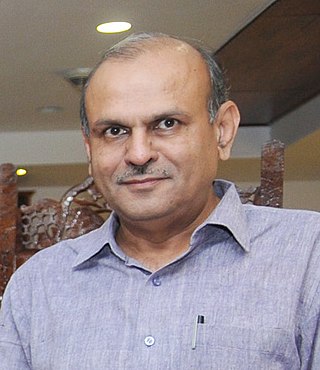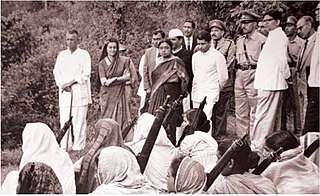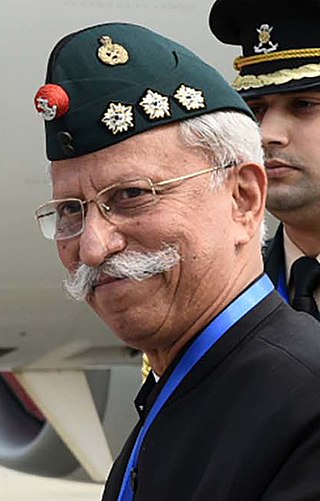
Vishwanath Pratap Singh,shortened to V. P. Singh,was an Indian politician who was the 7th Prime Minister of India from 1989 to 1990 and the 41st Raja Bahadur of Manda.

India is a federal republic comprising 28 states and 8 union territories. The states and union territories are further subdivided into districts and smaller administrative divisions.

The Indo-Tibetan Border Police (ITBP) is a border guarding force of India deployed along its borders with Tibet Autonomous Region. It is one of the five Central Armed Police Forces,established in 1962 in the aftermath of the Sino-Indian War of 1962.

Girish Chandra 'Gary' Saxena was a governor of Jammu and Kashmir state in India. Born in Agra in 1928,he joined the Indian Police Service (IPS) and held many positions in police and retired as Director of the Research and Analysis Wing,India's external intelligence agency. He took over as the head of the State on 2 May 1998 for the second time. Earlier,he held the office of the Governor J&K from 26 May 1990 to 13 March 1993.

The following outline is provided as an overview of,and topical guide to,India:
The Gawkadal massacre was named after the Gawkadal bridge in Srinagar,Jammu and Kashmir,India,where,on 21 January 1990,the Indian paramilitary troops of the Central Reserve Police Force opened fire on a group of Kashmiri protesters in what has been described by some authors as "the worst massacre in Kashmiri history". Between 50 and 100 people were killed,some from being shot and others from drowning. The massacre happened two days after the Government of India appointed Jagmohan as the Governor for a second time in a bid to control the mass protests by Kashmiris.

Sardar Farooq Khan is an Indian politician and former police officer who served with the Indian Police Service (IPS). He retired in 2013 as Inspector General of Police (IGP),Jammu and head of the Sher-I-Kashmir Police Academy at Udhampur. Khan is known for the creation of the Jammu and Kashmir Police (JKP) Special Task Force (STF) as well as being its first head in 1995;STF would later go on to be renamed as the Special Operations Group (SOG).

K Vijay Kumar,IPS,is a retired IPS officer. He was the chief of the Special Task Force of Tamil Nadu that was involved in the death of the Veerappan during Operation Cocoon of 2004. He had also been the senior advisor to Home Ministry for the Left Wing Extremism areas. He served as the Advisor to the Governor of Jammu and Kashmir with Home,Forest,Ecology &Environment,Health &Medical Education,Youth Services &Sports,Hospitality &Protocol,Civil Aviation,Estates and Information portfolios. Currently he has joined back as senior security adviser in Ministry of Home Affairs in December 2018.

The Government of Jammu and Kashmir is the governing authority of the Indian union territory of Jammu and Kashmir and its two divisions and 20 districts.
The Hashimpura massacre was the killing of 75 Muslim men by police on or around 22 May 1987 near Meerut in Uttar Pradesh state,India,during the 1987 Meerut communal riots. It was reported that 19 personnel of the Provincial Armed Constabulary rounded up 42 Muslim youths from the Hashimpura mohalla (locality) of the city,took them to the outskirts of the city,shot them in cold blood and dumped their bodies in a nearby irrigation canal. A few days later,the dead bodies were found floating in the canal and a case of murder was registered. Eventually,19 men were accused of having performed the act. In May 2000,16 of the 19 accused surrendered and were later released on bail. Whereas,the other three accused died in the intervening period. In 2002,the Supreme Court of India ordered that the case trial should be transferred from the Ghaziabad district court to a Sessions Court at the Tis Hazari court complex in Delhi.

Satya Pal Malik is an Indian politician. Malik served as the 10th and last Governor of the erstwhile state of Jammu and Kashmir,from August 2018 to October 2019,and it was during his tenure that revocation of the special status of Jammu and Kashmir was taken on 5 August 2019. Later,he moved to Goa,becoming 18th governor,and also served as the 21st Governor of Meghalaya until October 2022.
Harkrishan Lal Kapur was a former Air Vice Marshal of Indian Air Force and a member of the Indian National Congress who served as 11th Lieutenant Governor of Delhi from 16 November 1985 to 3 August 1988.

Rajive Kumar is a retired 1981 batch Indian Administrative Service (IAS) officer belonging to the Uttar Pradesh cadre. Kumar served as the chairperson of the Uttar Pradesh Real Estate Regulatory Authority from 2018 to 2023 and previously served as the Chief Secretary of the Government of Uttar Pradesh,in addition to serving as Shipping Secretary of India.

Ladakh Police is the police agency responsible for law enforcement and investigations within the Union territory of Ladakh, India. It came into existence on 31 October 2019.

The Administration of Union Territory of Ladakh(sic) is the governing authority of the Indian union territory of Ladakh and its two districts. The Administration is led by a Lieutenant Governor appointed by the President of India who acts on behalf of the central Government of India. Ladakh does not have an elected legislative assembly. The two districts of Ladakh both elect their own autonomous district council-the Leh Autonomous Hill development council and the Kargil Autonomous Hill development Council,which have competence over a range of domestic affairs.

Dr. Anand Prakash Maheshwari He is an IPS officer of 1984 batch,Uttar Pradesh cadre. His professional career as a soldier and policeman culminated as the Head of the largest paramilitary force in the world - The Central Reserve Police Force. Post retirement,he was appointed as the Advisor to Hon'ble Lieutenant Governor,Puducherry. He worked in this capacity till the formation of the State government.
P. K. Dave was an Indian bureaucrat,civil servant,former Chief secretary of Jammu and Kashmir state and 15th lieutenant Governor of Delhi,served in office for over five years from 1992 to 1997.
Kewal Kumar Sharma is a 1983-batch retired Indian Administrative Service (IAS) officer of Arunachal Pradesh,Goa,Mizoram and Union Territories (AGMUT) cadre. In November 2018,he was appointed as advisor to the governor of Jammu and Kashmir,Satya Pal Malik. Following the creation of the union territory of Jammu and Kashmir,he was appointed advisor to lieutenant governors Girish Chandra Murmu and Manoj Sinha. In February 2020,he was appointed as the chairperson of the JK Board of Technical Education. On October 30,2020 he resigned as advisor to the lieutenant governor and was appointed election commissioner of the union territory. Sharma has also served as advisor to the administrator od Chandigarh,chief secretary of Goa and Delhi after which he moved to the Union HRD Ministry where he served as Secretary Higher Education,Govt. of India.

The Directorate General of Security is an organisation of covert operations under India's Cabinet Secretariat. It is one of the four legally defined intelligence organisations of India and listed in the Schedule of the Intelligence Organisations Act,1985,the other three being I.B.,R&AW and NTRO. Since 1971,the Secretary,Research and Analysis Wing has usually held the post of Director General. This organisation used to be composed of Special Service Bureau,Aviation Research Centre,Special Frontier Force and Chief Inspectorate of Armaments. Since the shifting of SSB and CIOA to the Ministry of Home Affairs in 2001,DGS consists of ARC and SFF only. The Special Group,a non-Tibetan and Sarsawa-based unit of SFF,is also a DGS component.

Lieutenant General Kaiwalya Trivikram ParnaikPVSM,UYSM,YSM is a retired general officer of the Indian Army who is serving as Governor of Arunachal Pradesh. He is the first person from Maharashtra who take over as General Officer Commanding-in-Chief of Northern Command.
He is Currently serving as GST Council Member from Jammu and Kashmir UT, headed by Union Finance Minister.















